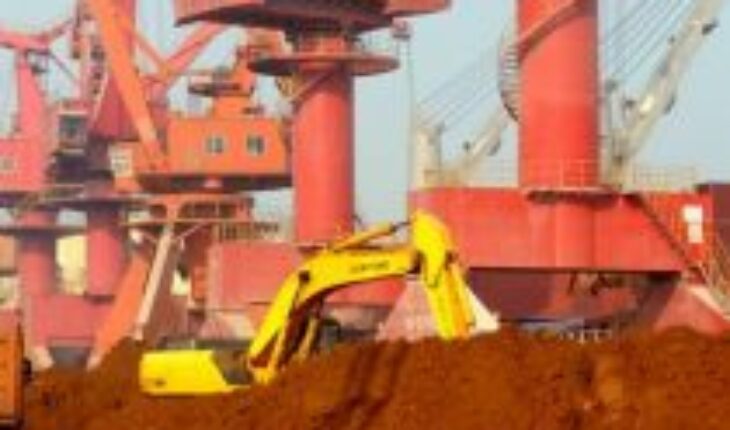As Europe, rocked by the war in Ukraine, tries to reduce its dependence on Russian energy supply, an even greater danger lurks in the shadows. Industrial metals and rare earths, vital to wind turbines, chips, solar panels and electric vehicles, are increasingly in demand, and mining these raw materials is concentrated in a few regions of the planet. And this could mean that, in the future, the headache has another name: China.
Germany imports many of the raw materials it needs for its development from the People’s Republic. And the concentration of the market is not only reduced to the extraction, but also to the processing of these materials. In both cases, China has much of the cake, explains Siyamend Al Barazi of the German Raw Materials Agency (DERA).
China has a monopoly
The European Union imports between 75 and 100 percent of the metals needed by its industry. Of the 30 subjects that the EU describes as “critical”, 19 come mainly from China. Among these are magnesium, where China has a near monopoly (93 percent), as well as rare earths (98 percent) and bismuth (93 percent).
The problem is that this dependency could increase in the future. The EU estimates that demand for cobalt will be five times higher than today in 2030. Due to the needs of electromobility, the demand for lithium could multiply by 18 by the same year. And by 2050, that figure could be 60 times higher than it is today.
Dependence as a means of pressure
As early as 2010 there were suspicions that China was using its export power as a means of political pressure. That year, Beijing limited the export of rare earths and, as a result, prices rose sharply. The matter came to the hands of the World Trade Organization, which arbitrated the case and led China to revoke the restrictions. “That reinforced Europeans’ confidence that China is playing by the rules of the game,” says Raimund Bleischwitz, scientific director of the Leibniz Center for Tropical Marine Research.
However, Europe cannot be sure that in the future the growing demand will be met. According to a report published by the Handelsblatt newspaper on March 25, 2022, experts from China’s Ministry of Industry and Information Technology debated in January 2021 about the possibility of curbing the shipment of rare earths to the United States.
Europe should not really be surprised if supplies of raw materials from China are reduced. In its most recent five-year plan, Beijing made it clear that resource exports must be restricted and that the country must focus on meeting domestic demand. Instead of exporting raw materials, China wants to become the leader of the technology market.
Will Germany be able to reduce its dependence?
Germany, for its part, has at least already recognized the importance of the problem. For years, it has been trying to diversify imports of raw materials. Rare earths are no longer only brought from China, but also from Brazil. In addition, in 2010 the German Raw Materials Agency (DERA) was founded, which constantly monitors critical raw materials and their availability.
DERA studies show that, in practice, Germany remains highly dependent. DERA analyzes where 27 refined products come from. The result: “In the case of 25 of those products, China is the main producer, more than 90 percent,” says Al Barazi.
Rare earth mine in northern China.
To affect the market, China doesn’t even have to have bad intentions. The Asian giant must also pay more attention to sustainability and environmental protection. Inspections carried out late last year in the magnesium industry resulted in numerous producers having to stop their work and the price per ton went from $2,000 to $10,000. The same thing happened with silicon, says Al Barazi: there were electrical rationing and the production of silicon, which consumes a lot of electricity, had to be reduced.
Europe could boost its own mining
The issue of security of supply of materials has also been an issue at EU level for some time. The European Raw Materials Alliance (ERMA) was founded in the autumn of 2020, and its purpose is to improve security of supply, in addition to diversifying imports of raw materials. AdeMoreover, Europe intends to open its own veins and strengthen the refining process.
Protests in Belgrade against lithium mining.
“For some years the EU has made efforts to promote mining and add value to raw materials,” explains Al Barazi. Because Europe also has raw materials, but Europeans are reluctant to have dirty mining production close to home. In Spain, for example, there were protests against a mine that would extract lithium in Extremadura. In Serbia and Portugal, lithium mining has also faced problems. Even in Germany there is lithium on the Rhine and in Saxony.
Another problem is the financing of new mining projects and plants to process raw materials, Al Barazi explains. There is a lack of risk capital, basically because European production is uncompetitive. China has subsidized extraction since the nineties, drastically expanding processing capacities. In addition, it has very lax environmental regulations. That allows prices to be so low that it is impossible to compete. However, after a complex search for investors, lithium mining in Saxony will begin in 2025.
The one who keeps always has
To protect against the eventual lack of imports, many EU countries, in addition to the United States and Japan, have been reserving metals and raw materials. So far, Germany has mainly stockpiled oil and gas.
With all the considerations on the table regarding how dangerous it is to depend on China, we must not forget that “China also depends on imports from Germany,” says Bleischwitz. “Before the outbreak of the pandemic, China imported more raw materials from Europe than it exported, such as agricultural products, forestry or processed metals.” So, the dependence is mutual.





